
Black Heart is a 1983 novel by Eric Van Lustbader, which makes some reference to the 1960s rise of the Khmer Rouge. [1] [2] [3]

Black Heart is a 1983 novel by Eric Van Lustbader, which makes some reference to the 1960s rise of the Khmer Rouge. [1] [2] [3]
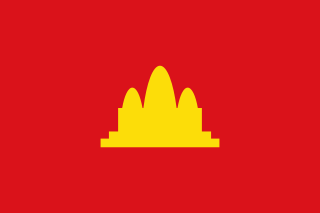
The Khmer Rouge is the name that was popularly given to members of the Communist Party of Kampuchea (CPK) and by extension to the regime through which the CPK ruled Cambodia between 1975 and 1979. The name was coined in the 1960s by then Chief of State Norodom Sihanouk to describe his country's heterogeneous, communist-led dissidents, with whom he allied after his 1970 overthrow.
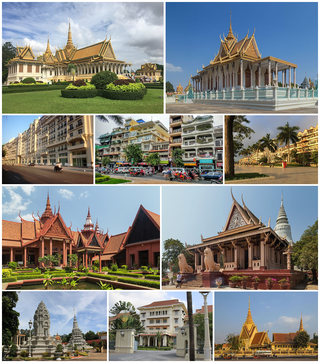
Phnom Penh is the capital and most populous city of Cambodia. It has been the national capital since the French protectorate of Cambodia and has grown to become the nation's primate city and its economic, industrial, and cultural centre.

Marshal Lon Nol was a Cambodian politician and general who served as Prime Minister of Cambodia twice, as well as serving repeatedly as defence minister and provincial governor. As a nationalist and conservative, he led the military coup of 1970 against Prince Norodom Sihanouk, abolished the monarchy, and established the short-lived Khmer Republic. Constitutionally a semi-presidential republic, Cambodia was de facto governed under a military dictatorship. He was the commander-in-chief of the Khmer National Armed Forces during the Cambodian Civil War. On April 1, 1975, 16 days before the Khmer Rouge captured Phnom Penh, Lon Nol fled to the United States, first to Hawaii and then to California, where he remained until his death in 1985.
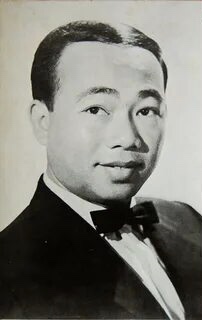
Sinn Sisamouth was a Cambodian singer-songwriter active from the 1950s to the 1970s. Widely considered the "King of Khmer Music", Sisamouth, along with Ros Serey Sothea, Pen Ran, Mao Sareth, and other Cambodian artists, was part of a thriving pop music scene in Phnom Penh that blended elements of Khmer traditional music with the sounds of rhythm and blues and rock and roll to develop a Cambodian rock sound. Sisamouth died during the Khmer Rouge regime under circumstances that are unclear.

Ieng Sary was the co-founder and senior member of the Khmer Rouge and one of the main architects of the Cambodian Genocide. He was a member of the Central Committee of the Communist Party of Kampuchea led by Pol Pot and served in the 1975–79 government of Democratic Kampuchea as foreign minister and deputy prime minister. He was known as "Brother Number Three" as he was third in command after Pol Pot and Nuon Chea. His wife, Ieng Thirith, served in the Khmer Rouge government as social affairs minister. Ieng Sary was arrested in 2007 and was charged with crimes against humanity but died of heart failure before the case against him could be brought to a verdict.
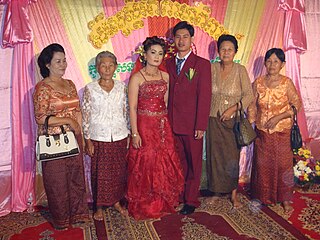
Chinese Cambodians are Cambodian citizens of Chinese ancestry or Chinese of full or partial Khmer ancestry. The Khmer term Khmer Kat Chen (ខ្មែរកាត់ចិន) is used for people of mixed Chinese and Khmer descent; Chen Khmer (ចិនខ្មែរ) means Cambodian-born citizen with ancestry from China. The Khmer constitute the largest ethnic group in Cambodia among whom Chen means "Chinese". Contact with the Chinese people such as envoys, merchants, travelers and diplomats who regularly visited Indochina verifiably existed since the beginning of the common era. However the earliest record of a Chinese community in Cambodia dates to the 13th century.
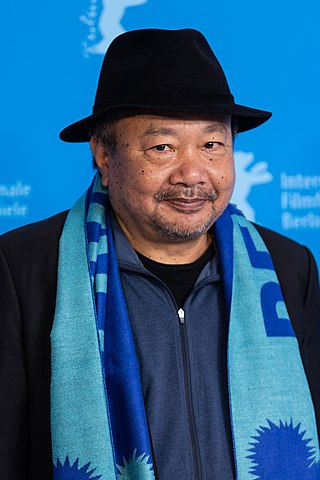
Rithy Panh is a Cambodian documentary film director and screenwriter.

Cinema in Cambodia began in the 1950s, and many films were being screened in theaters throughout the country by the 1960s, which are regarded as the "golden age". After a near-disappearance during the Khmer Rouge regime, competition from video and television has meant that the Cambodian film industry is a small one.

Kampuchea, officially known as Democratic Kampuchea from 5 January 1976, was a one-party totalitarian state which encompassed modern-day Cambodia and existed from 1975 to 1979. It was controlled by the Khmer Rouge (KR), the name popularly given to the followers of the Communist Party of Kampuchea (CPK), and was founded when KR forces defeated the Khmer Republic of Lon Nol in 1975.

Soth Polin is a famous Cambodian writer. He was born in the hamlet of Chroy Thmar, Kampong Siem District, Kampong Cham Province, Cambodia. His maternal great-grandfather was the poet Nou Kan. He grew up speaking both French and Khmer. Throughout his youth, he immersed himself in the classical literature of Cambodia and, at the same time, the literature and philosophy of the West.
The National Day of Remembrance, formerly called the National Day of Hatred, which falls on May 20, is an annual event in Cambodia. It commemorates the Cambodian genocide of the Khmer Rouge regime that ruled the country between 1975 and 1979. It became a national holiday in 2018.

Notre Dame Cathedral, also known as the Cathedral of Phnom Penh, was a 19th-century French Gothic revival church that served as the cathedral of the Apostolic Vicariate of Phnom Penh. It was located in the Russei Keo District of the city on Monivong Boulevard.

The Communist Party of Kampuchea (CPK), also known as the Khmer Communist Party, was a communist party in Cambodia. Its leader was Pol Pot and its members were generally known as the Khmer Rouge. Originally founded in 1951, the party was split into pro-Chinese and pro-Soviet factions as a result of the Sino–Soviet split with the former being the Pol Pot faction, and the latter adopting a more revisionist approach to Marxism. As such, it claimed that 30 September 1960 was its founding date, then it was named the Workers' Party of Kampuchea before it was renamed the Communist Party in 1966.

Davy Chou is a Cambodian-French filmmaker. He has written, directed and produced several films. Chou made his feature length debut with Diamond Island (2016) and made his follow-up with the film Return to Seoul (2022).
The Cambodian humanitarian crisis from 1969 to 1993 consisted of a series of related events which resulted in the death, displacement, or resettlement abroad of millions of Cambodians.
The fall of Phnom Penh was the capture of Phnom Penh, capital of the Khmer Republic, by the Khmer Rouge on 17 April 1975, effectively ending the Cambodian Civil War. At the beginning of April 1975, Phnom Penh, one of the last remaining strongholds of the Khmer Republic, was surrounded by the Khmer Rouge and totally dependent on aerial resupply through Pochentong Airport.
The following lists events that happened during 1975 in Cambodia.
Cambodian rock of the 1960s and 1970s was a thriving and prolific music scene based in Phnom Penh, Cambodia, in which musicians created a unique sound by combining traditional Cambodian music forms with rock and pop influences from records imported into the country from Latin America, Europe, and the United States. U.S. armed forces radio that had been broadcast to troops stationed nearby during the Vietnam War was also a primary influence. This music scene was abruptly crushed by the Khmer Rouge communists in 1975, and many of its musicians disappeared or were executed during the ensuing Cambodian genocide. Due to its unique sounds and the tragic fate of many of its performers, the Cambodian rock scene has attracted the interest of music historians and record collectors, and the genre gained new popularity upon the international release of numerous compilation albums starting in the late 1990s.
Mao Ayuth was a Cambodian filmmaker and politician. One of the few filmmakers to survive the Khmer Rouge regime, he was noted, alongside Dy Saveth, Yvon Hem, and Bun Yim, as connecting contemporary Cambodian cinema with its golden age of the 1960s and 1970s. He died during the COVID-19 pandemic.
Ly Theam Teng was a Sino-Khmer literati, who authored many books including novels which have become classics of Cambodian literature, before he died of exhaustion under the Khmer Rouge in 1978.